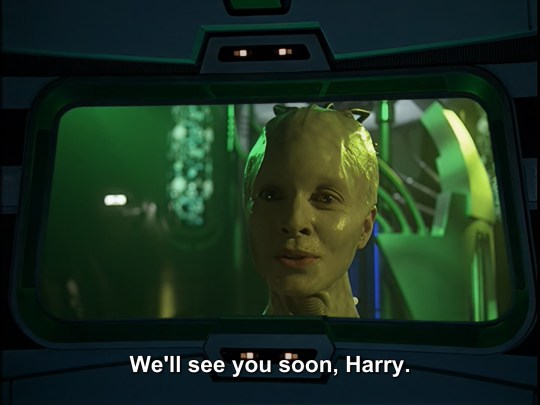#picard season 1
Text
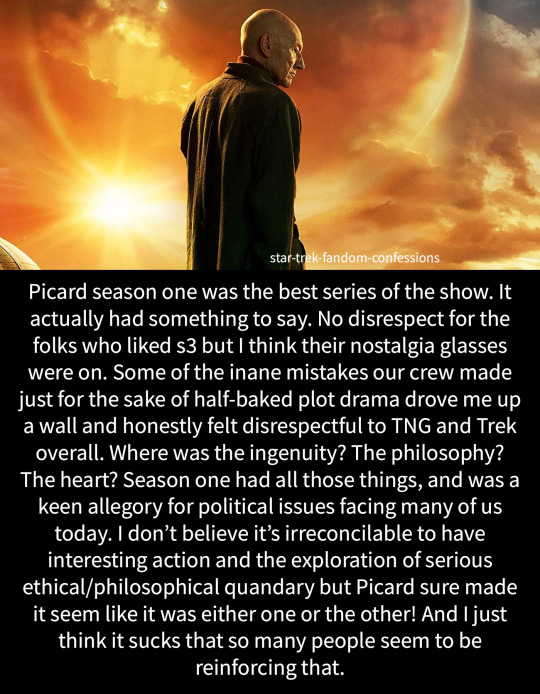
COnfession #124
"Picard season one was the best series of the show. It actually had something to say. No disrespect for the folks who liked s3 but I think their nostalgia glasses were on. Some of the inane mistakes our crew made just for the sake of half-baked plot drama drove me up a wall and honestly felt disrespectful to TNG and Trek overall. Where was the ingenuity? The philosophy? The heart? Season one had all those things, and was a keen allegory for political issues facing many of us today. I don’t believe it’s irreconcilable to have interesting action and the exploration of serious ethical/philosophical quandary but Picard sure made it seem like it was either one or the other! And I just think it sucks that so many people seem to be reinforcing that."
36 notes
·
View notes
Text


“Home” isn't easy to define, but you know when you're there.
#regionalpancakeedits#star trek la sirena#I’m forever a sucker for found family around a dinner table#nepenthe haters are not invited to the pizza party#star trek picard#seven of nine#raffi musiker#agnes jurati#cristobal rios#soji asha#elnor#Kestra troi-Riker#deanna troi#will riker#jean luc picard#food#alcohol#picard season 1.5#picard season 1
97 notes
·
View notes
Text
As I scream into the void seeking a Narek RPer to play against, I have finally caved and must explain why I want this Romulan loungelizard to be more popular. (It won't happen, but I can dream.)
Reasons I like Narek as a character that nobody but me gives a shit about:
Let me preface this with a fact about me: I know Romulans.
I've RPed as Nero for almost two straight years in a large game. I've basically learned Rihannsu back to front for the endeavor. The person who played my Ayel and I both dumped countless hours into developing grammar and extrapolating cultural rules. We were dedicated to making them as believeable and accurate to canon as possible.
I have the whole timeline of the destruction of Hobus/Romulus down to memory. I know about all the neat little tidbits and trivia from comics and adjacent materials etc, etc.
This is to say: I have read and written quite a lot about Romulans in my time. I am very familiar with how they work and what data is available to draw from when writing them.
We do meet a few rank and file military Romulans from time to time, however. So we know how the general military operates in direct contrast to the Tal'Shiar. Caution and secrecy is sort of baked into their culture, which makes a lot of sense given that they're constantly at war with basically everyone, but they aren't (generally) unreasonable people.
In canon Trek, Romulans are often a little over the top with the sneaky-backstabbing-untrustworthy-nonsense. They're almost comical with how much scheming they do, but most of the Romulans we meet in canon are Tal'Shiar. The Tal'Shiar are known, pretty explicitly for the depth and breadth of their sneaky-backstabbing-untrustworthy-nonsense. It's kind of their whole deal, apart from mnhei'sahe (literally the ruling passion honor).
Narek, however, was a child when Hobus went supernova. He is from the very last generation that had any living memory of Romulus. (Elnor is also from this generation and they are great foils for each other, but that's another essay.) Narek is from a (presumably) respected family of--if not Tal'Shiar then Military--operatives. His aunt held high rank, his sister did as well, and both were inducted into the Zhat Vash, an organization that worked so quietly and efficiently that even the famously paranoid Tal'Shiar thought they were a myth. They orchestrated catastrophes and manipulated Galactic law to their ends, one of their members was the head of Starfleet Security and Narissa was on a personal basis with her.
Their underlying culture is present, but it isn't explored very deeply in any one canon source. Taken collectively, however, it is just as substantial as Klingon Battle-lust or Ferengi Capitalism.
Nero was a break from the norm, not because he was vengeful, but because he was the first non-military Romulan we'd ever really seen. His designs, the tattoos, the crew of his ship with their very un-Romulan loyalty, the way he talked and sought equivalent exchange of lives (mnhei'sahe), was a wealth of Romulan culture that we hadn't ever seen. He was a regular Joe, had a regular non-Military job, trusted and worked with aliens to try and save lives. His failure (not his fault) was something he absorbed and sought to rectify in the Romulan way.
Nero was super interesting both for how much detail he cast on Romulan culture, and in how he slotted into the Prime Timeline. Nero was a guy desperately clinging to hope, to the last vestiges of his civilian life, but he was cut free by the destruction of Romulus and set adrift. The only anchor he had in the AOS timeline was his honor and the driving need to balance the scales and restore it.
Narek, however privledge his family was, was a washout. He was a failure. We know he wasn't Zhat Vash, and whether he was even Tal'Shiar is up for some serious speculation. He doesn't act like military officers, and only seems to be play-acting as a Tal'Shiar, miming his sister when it suits him.
Narek may have had authority on the Artifact, but it was probably by dint of Oh granting it. We never get any clarification whatsoever about his rank or dayjob, just that he is fully devoted to helping the Zhat Vash. He is analytical, prepared, but he is not good at thinking on his feet and clearly does his planning off screen. He's meticulous but not especially skilled at hiding or regulating his emotional state. He is far less aggressive and stalwart than just about every other Romulan we've seen...except for Nero.
He was literally a placeholder sent to keep tabs on Soji. He didn't even arrive until Narissa had failed to capture Dahj. That Narek managed to get close to Soji, that he discovered her dreams and correctly surmised what they are, was more luck than skill. Before his assessments the Zhat Vash knew that Dahj (and Soji) could be activated out of their cover, but they assumed that they could capture them. They probably assumed they could torture the data out of them, if not dissect them and rip out a harddrive.
Narek found an easy way to get right to the information they needed. His attachment to Romulan culture is his puzzlebox--Before Nero we had never met a Romulan civilian and before Narek we have never met a cultural Romulan who plays with a toy, we had never seen a child's toy like that. Of course, the puzzlebox (Tan Zhekran) was a mechanism to illustrate his thought process, to make the differences between Narissa and him very apparent, but it was also something from his childhood (presumably). It's a weirdly personal affect for a Romulan and he fidgets with it almost constantly. It's a tell, something he shouldn't have, and it makes him accessible on an emotional level.
Narek is a civilian.
He's a civilian in a family of spies and operatives, raised alongside his sister on the same stories, with the same care. There's no way a Zhat Vash didn't have a family home on Romulus. While Elnor is a nice example of the new generation of Romulans, Narek is one of the last examples of what is used to mean to be a Romulan. He saw Romulus and escaped with all his surviving family when it as it was destroyed. Narek was raised on Romulan tradition (private names for family), Romulan stories about the end of the world, and he is haunted by them because he knows they're true, they're real. His sister and aunt have seen it, seen the message that drives people mad, about Ganmadan. His living relatives have dedicated their lives to preventing it and, even if he isn't actually Zhat Vash, he does the same.
Narek is a failure, by his culture's standards, by his family's standards, but he is also the only one of them who lives in the end.
He's a civilian who is trying, desperately, to avert another Romulan apocalypse. He has already lived through one and somehow this next one is even worse. Like Nero he sees the writing on the wall--but instead of doubling down on the traditional sneaky spy shit, he tries something new--unlike Nero, it works! He makes headway where nobody else could.
Unfortunately, it's kinda fucked up, but he then gives up everything in the pursuit of this goal. (Which to him, seems like a noble one.) Narek gives up who he is (by playing at being Tal Shiar), his safety (he has no idea what Soji is capable of or what might set her off, they only have records of Dahj killing a dozen agents before being blown up), and eventually resigns himself to killing the woman he's fallen in love with (the baseline requirement for giving out his real name). He does it all for the greater good, to save people and he doesn't seem to make much of a distinction between Romulan and other organic lives. He has his little plans, tracking La Sirena in a single cloaked ship, hiding his presence to tail them, firing on them despite being wholly outmatched, allying with Sutra however temporarily, trying to sway Soji again, turning to Rios, Raffi, and Elnor for help--he's willing to do anything because he's terrified that everything is about to end and it will be him who failed to prevent it.
The very last shot we see of him, after his plan to detonate the transmitter fails completely, is him on the ground being dragged away by the Coppelius androids. He doesn't posture or threaten, doesn't say ominous shit like the other Romulans we're used to--He begs. He claws at the ground, trying to stay, and he begs. He pleads with Soji, calls her his love, tries that last ditch hail mary because it's all he can do. He fails his task and she's the last person he can reach out to and, in the end, despite the very real threat to her life, Planet, and Picard, Soji smashes the transmitter. The apocalypse is averted.
Narek failed but he also succeeded. His aunt is dead, Oh has been outed as a traitor, and his sister is killed by Seven of Nine. In a cut scene, apparently, Narek was supposed to be arrested by Starfleet. So he's facing (at the very least) retribution from the androids and the ExBorg. Starfleet is very likely to arrest and interrogate him, if not imprison him indefinitely since he has ties to the Zhat Vash and, subsequently, will be on the hook to explain the Utopia Planetia disaster. Soji hates him, for good reason, and his homeworld is long gone. Narek has nothing...but the world was saved.
Narek is singular because he's all about needing and interacting with other people, he has no real authority, nobody he commands. He's a civilian (insofar as any Romulan can be) and is a soft, emotional boy who hangs on to his childhood toys. He's driven in equal parts by fear and a deep sense of failure, like everyone else in the show, and he takes the steps that seem right and necessary to him (also like everyone else on the show).
Narek was a great contrast against Elnor in every possible way--from his evasiveness to his fear of death--and he was a great foil for Soji. On Coppelius, Soji's terror clouds her judgment and she very nearly does terrible things to protect herself. Her actions, her opinions, her hesitation were all driven by fear. The ends seemed to justify the means. She reflects Narek's state for the whole show. Season 1 is about finding safety and meaning.
Narek is afraid for the whole duration of the show and his choices all reflect that same desperate need to find permanent safety, to live. Soji exists on the peripheral of that with the Ex-Borg, and as a synthetic, and then she falls headlong into it after his betrayal. Narek regrets trying to kill her and the symbolism of his losing that box, of him trying to kill her in a room that is so very culturally Romulan, right after telling her his name, makes it very clear that killing her is killing some piece of himself. But the ends justify the means. He can and will give up everything to save the world.
And his last line in the show is desperately pleading with the woman he loves as he's dragged away.
Then we never see him again or get anything resembling closure for Soji or Narek.
Which I will be big mad about forever, because they didn't even get the bare minimum acknowledgement and closure of "moving on and living life is paramount because it is finite and beautiful ". Nope. Nothing. I'm furious forever.
Thank you for coming to my TED talk. I hope if Star Trek Legacy happens we get Narek as a sort of...side character creeper informant ala Garak. I also hope we get Soji on Seven's Enterprise because I love her.
#Star Trek#Star trek picard#picard season 1#soji asha#soji#narek#elnor#picard#Nero (Star Trek)#AOS related musings#romulan star empire#romulans star trek#romulan#romulans#if anyone needs a full romulan dictionary hit me up#Mnhei'Sahe is the concept of honor tied to the foundations of yourself where 'failure' is akin to dishonor and righting the scales is#the number one priority regardless of what atrocities must be committed to accomplish it.#Nero was a failure and had to destroy Vulcan and Earth to equal the lives on Romulus - equivalent exchange#Narek is a failure who has no cultural capital to spend outside of his own life and safety and spends everything he has without hesitation.#Soji needs better taste in men but I still ship it#in this essay i will#Not rp#character meta#ooc post
16 notes
·
View notes
Photo


The Riker hug
Star Trek: Picard, Season 1, Episode 7
235 notes
·
View notes
Text
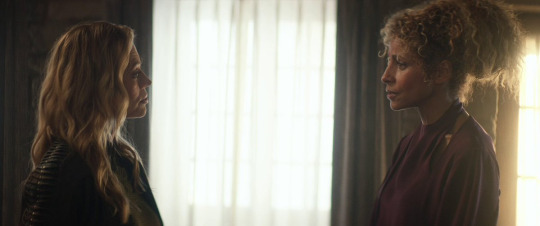
Happy birthday to the episode that started it all ❤️
#saffi#r/7#raffi x seven#seven x raffi#star trek pic#stardust city rag#seven of nine#raffi musiker#star trek picard#picard season 1
34 notes
·
View notes
Text
Five Episodes Later: Reevaluating Picard
I started this rewatch to refresh my memory so that I could tackle the question of whether the fandom had judged Picard too harshly and if it was as dark and dystopian as was commonly accused.
Through that process I have discovered much that is praiseworthy, some implications that bother me, and more than a few questions that pivot on one’s own subjective response to particular cues about whether and when the protagonists are objectively correct or if there is far more room for them to be messy.
For more like this check out my other essays reevaluating Star Trek Picard and interrogating the widely held fandom criticism that Picard made the Federation into a Dystopia.
The Dystopia Question
Ultimately what I’ve found is that Season One is less of a deconstruction of core ideas about Star Trek, than a richer exploration of the premises of Voyager and Enterprise: what happens when decent people are caught in ambiguous situations and without the resources of an entire Federation behind them?
The backdrop of the failure of the Romulan resettlement effort after the destruction of Utopia Planitia also has resulted in a schism of sorts in the fandom wherein most people are horrified and immediately saw fit to draw analogies to Brexit or the Trump administration, while a disturbing minority shrugged off the catastrophe as the Romulans getting what they had coming to them and have argued the Federation had no moral obligation to help the Romulans.
My own examination of the evidence has led me to feel that there is a strong case for a murky middleground. We could presume for instance that Admiral Clancy is a reactionary who is overstating the case for Starfleet minding its knitting and having too many domestic obligations.
On the other hand we could steelman her case with a very large body of evidence consisting of a vast number of instances where it falls to Starfleet to provide timely disaster relief and protection to the Federation’s vast and underserved frontiers. We need look no further than perhaps dozens of TNG plots to support the idea that an overextended Starfleet would come with a bodycount.
This certainly pushes back on the metanarrative of the Federation and the implication of limitless resources. Although that has always been exaggerated. There’s material abundance enough to provide everyone who doesn’t intentionally seek to rough it on a colony with a comfortable life, even if you’re a disgraced former attache to an embittered former hero turned recluse. What there isn’t enough of is whatever handwavium and skilled personnel are needed to snap one’s fingers and produce a new rescue fleet without depriving others of humanitarian relief and protection.
Again, that assumes we steelman Clancy. There is a lot of narrative weight pushing us to trust Picard’s assessment of the situation post-Mars: he is the hero after all. The hostile interview of the first episode was loaded with a lot of not so subtle triggers for humanitarian minded viewers that seem very intentionally designed to place them in the emotional space of that creeping dread that empathy is dead, having been replaced by an unapologetically narrower conception of who is deserving of respect, comfort, and even life.
However, I think that given Picard the character will spend the first five episodes questioning his own place in the narrative of his life and the lives of others, I think the Federation as a character is owed a serious examination of whether we should simply throw out everything else we have ever known about the society the first time someone is rude to a father figure to many of us.
That doesn’t necessarily mean the Federation was actually in the right to leave the Romulans twisting in the wind. It wouldn’t be the first time a judgment on which many, which few, and what needs results in painful and potentially unvirtuous choices: just ask the Maquis.
Radical Kindness in a Dark World
If I could sum up the theme of Picard the series, this would be it. In the very first episode Picard the character is moved from despair to man of action by the opportunity to help a troubled soul.
This message is something I think that really got lost. The part of the audience that was offended by the callousness of the Interviewer and Clancy and the implication that to be risk averse and reluctant to risk being the frog in the story of the scorpion and the frog was already primed to be irked by this theme.
I suspect that the element of the audience that felt itself keenly under threat by forces outside the Star Trek setting that the series was gesturing at may also have missed this theme in their annoyance at sci fi Paladin, Jean luc Picard, being portrayed as defeated, depressed, and content to marinade in luxurious misery.
Quite a few people seem to react poorly to being told that a minimum level of mercy extended to a known villain might be virtuous and a long term investment that might create conditions of real peace.
Nor does anyone like being accused of sequestering themselves in comfort and nursing their grief when direct and easy solutions to vast and pernicious problems don’t miraculously appear.
So in this way, Picard called out a lot of its potential audience practically in the first episode.
These are hard questions to grapple with and I don’t want to trivialize them. When do we risk our safety to take advantage of an opportunity to end a conflict, make an ally, or even to simply show mercy with no expectation of benefit?
We can't know with certainty when we're playing the part of the frog in the parable of the scorpion and the frog after all. Read that again with different emphasis.
How harshly should we judge others or ourselves for not being able to imagine a better world or being unable to find the steps we could take to make it happen when the easy steps like voting, protesting, signing a petition, or threatening to resign fail?
If TNG primed us to expect simple answers, those aren’t found in Season One. There is a mostly self consistent moral clarity that mercy and kindness are praiseworthy but the show’s world building doesn’t support the idea that these are always going to lead to just outcomes.
The people who adhere to these ideals are generally, in my opinion, the more fun hang but whether they’re always right or not according to the narrative is troublingly ambiguous at times.
I have a suspicion that part of what appeals to people about Season Three, aside from the fact it brought back beloved and relatively uncomplicated legacy characters and largely benched the characters invented for the show, is that the morality of the show is just generally way less ambiguous. Unless you’re taking Shaw seriously that is.
Notably, the show by the end of episode five does step on this message just a bit. The midpoint of the season leaves us weighing whether or not Seven executing a gangster notorious for chopping up liberated Borg is harm reduction or a reduction of her humanity. The implications of this I found rather uncomfortable for the way the bleaker side of the scale seemed to have a lot more narrative weight.
Character Housekeeping
I have largely not really discussed Jurati, Rios, Elnor, Soji, and Narek up to this point. The reasons for this are relatively straightforward. None of them have really done anything that I feel the need to explore more deeply. This is not necessarily a dismissal of the characters, if you adore them we are not enemies, I’m simply just less interested in them than other topics at this point in the season.
Rios is a fun character and I love his holograms….and that’s about it. Up to this point he is interesting in terms of his relationship to Picard and what it says about Picard that he can clock a troubled ex-Starfleet officer within a minute of meeting them and, like Raffi, Picard seems to be inexorably drawn to people he can try to remold in his image.
Elnor is himself not very interesting to me, I don’t dislike the character, but he seems to function mostly as a narrative device to illustrate Picard’s failings after Mars and his tendency to struggle with expressing authentic emotions rather than praising people in the modality of a performance evaluation. He is also, if I recall, rather underutilized and developed as his own person going forward. He is almost entirely muscle and comic relief in episode five instead of making any meaningful connections to any other characters.
Soji was originally interesting the first time I watched the series largely because of the mystery she represented but I know the ending already. The character herself doesn’t provoke any response from me. That doesn’t invalidate someone else’s experience and if someone wants to write up a comprehensive analysis of Soji’s identity crisis as a metaphor for dysphoria or whatever, have at it. That’s not really my wheelhouse though and I’m content to let the people for whom that is a passion project do it infinitely better than I ever could.
I may revisit Soji later because I am still troubled by her and Dahj’s story due to being somewhat unconvinced that it was necessary to conceal their memories and identities from themselves. It's unclear to me if there was a plan in place to recover them and then permit their true selves to reemerge in a gentler, more compassionate way after their mission was complete.
I’m far more sympathetic to Jurati this time around because I think her performance of being deeply disturbed by the Admonition is well done, but like Soji, at this point in the narrative I just don’t see anything I really care to talk about in any greater depth aside from observing that Jurati is a good surrogate for a particular kind of fan. Her performance of being unmoored by Oh’s psychic shenanigans was strong, but on a meta level if you feel like Maddox’s death was largely for shock value and unnecessary “edge” then I’m moderately sympathetic to you.
Screw Narek and his affected mental distress and gaslighting and double dumbass on his weird sister. I still don’t know who thought the implied incest stuff was a good idea or if there’s just something I’m missing, but its incredibly distracting.
Unanswered Questions
What is Seven’s arc like for the rest of the season? I don’t actually remember. Oh I remember what she does, I just don’t remember how it feels and to what degree it moves her closer to the less rampagey version who seems to be clinging harder to her humanity in Season Three.
What was the Synth plan? As Agnes notes, Maddox got a little “secret planny” so does this mean that no one else was in the loop for the plan to send Soji and Dahj out to uncover the truth behind the attack on Mars and the subsequent Synth ban and thus Maddox’s death screwed everything up? Was there a plan to recover them and restore their identities without the need for the traumatic rediscovery of their true selves through crisis and stress?
After Seven decided to solve her own personal trolley problem through summary vaporization, where does that leave the default moral assumptions for Star Trek Picard? Is this still a show where what is good is what is just or is virtue a luxury and justice is liquidating a mass murderer who can’t be practically brought to justice?
Is everyone, both the characters and the fandom, right about the Federation? Has it been irredeemably debased? Or is Picard, the character right, and what’s needed is to find the right sort of appeal to conscience?
For more like this check out my other essays reevaluating Star Trek Picard and interrogating the widely held fandom criticism that Picard made the Federation into a Dystopia.
#star trek#star trek ethics#dystopia#star trek picard#star trek picard rewatch#picard season 1#Picard s1e5#seven of nine#agnes jurati#jean luc picard#cristobal rios#bruce maddox#narek#raffi musiker#soji asha#dahj asha#elnor
16 notes
·
View notes
Text
Thoughts on Narek’s character
I started writing this ridiculous essay in June of 2021 after I watched season 1 of Picard. @shadowinthefire found a post from back then about the fact that I was writing this whole-ass essay and asked if I would post the essay itself, which I never finished because I decided it wasn’t worth it to start fights with people (and I gained enough distance from the specific irritating exchanges I had about Narek, reported in the essay below, that they were no longer actively pissing me off).
I put the whole thing under a “read more” link because I realize that most people will not care XD
Having finished watching season 1 of Star Trek: Picard, attempted to talk to some people about it, and poked around in the tags, I have found that Narek is the most polarizing character. He seems to be this show/fandom’s Loki or Kylo Ren: one segment of the fandom (myself included; I’m habitually prone to villain-sympathizing) finds him at least somewhat sympathetic and thinks he has the potential for redemption, while another considers him a worthless, irredeemable jerk and “abuser”... a term that’s more appropriately applied here than to some of the other polarizing characters it’s thrown at, but I’m not entirely sure it’s to the point here, either, and I think the emotional charge of the word (inevitably associated with the ‘social justice’ sensibilities of the Tumblr Left) often obscures more than it illuminates.
Insofar as Narek deceives Soji, manipulates her, uses her for his own aims (finding the synths’ homeworld), tries to kill her, and then follows her after she escapes -- all while claiming that he loves her, and possibly even believing it himself -- it seems apropos to term it an abusive relationship, and him an abuser. However, most relationship abuse, as we tend to understand it, doesn’t involve an intelligence agent seducing a target for information. In general, it strikes me as odd to talk about spies who use “honeypotting” or “honeytrapping” as a tactic as “abusers,” because the point is very different. The target is not just a random victim for the spy to control for the sake of a power trip; there’s something specific that the spy wants to accomplish, and the target is collateral damage in the pursuit of that aim. (This is also different from raising and molding children to serve a specific purpose in a way that’s harmful to them, which definitely counts as abuse -- think Enabran Tain with Garak in DS9, or Thanos with Gamora and Nebula in the MCU. Parents have a special responsibility to their children, biological or adopted, to love them unconditionally and act in their best interests. People get into sexual relationships for all kinds of reasons, and while you might think we all have a Kantian responsibility not to treat others as a mere means, it seems unhelpful to apply the term “abuse” to all violations of that duty.)
In the case of Narek and Soji specifically: he sincerely believes that synthetic life will bring about the destruction of all organic life in the galaxy (or universe?), and thinks there is a real possibility that she is Seb-Cheneb, the Destroyer foretold in ancient myths that seemed to be corroborated by the Admonition, which he believes to be the historical testimony of a highly advanced society. From that perspective, Soji is a powerful and dangerous enemy, even though Narek knows that she doesn’t recognize that yet, and is to that extent innocent.
So, what about the fact that Narek keeps claiming that he loves Soji, even during and after his attempt to kill her? That sounds like classic abuser shit: the whole “I love you so much I can’t let anyone else have you,” “the reason I hurt you is because I love you,” “you have to forgive me because I love you so much.” It may or may not matter whether you think he believed it himself: abusers (the argument goes) don’t know what real love is; they might think they love their victim, but they couldn’t really love them if they’re still capable of hurting them. FWIW, I think he does believe he loves her, and it’s not just something he’s lying about to get her to trust him; and I think that largely because Narissa accuses him of having fallen in love with Soji. Narissa, as his sister, knows him very well, and psychopaths (which I think Narissa is but Narek is not) are often very perceptive about other people’s emotions.
Parts of the abuser pattern don’t apply to Narek: he never says he’s hurting Soji because he loves her; it’s all very much despite. But isn’t it abusively manipulative to say that he loves her -- even if he thinks it’s true -- first while he’s trying to gain her trust for the sake of betraying her, then, while crying, when he’s trying to kill her, and again when sees her after having tried to kill her? Isn’t he saying it to try to get her to feel sorry for him or feel guilty for holding him prisoner, to make her doubt herself, to give him an opening to escape and try to kill her again, along with all of her people?
Well... yes and no. Saying he loves her while he’s still working on getting her to reveal the location of the android planet is a tactic; it’s part of the honey trap thing. Falling in love with the target of your honeypot scheme is very bad form for a spy, but it’s a pretty common feature of spy stories involving that strategy. (A major departure from the way that trope usually shows up -- which I think is relevant to the difference in how people perceive it -- is that in this case the honey-trapper is a man and the target is a woman, so they’re easier to fit onto the abuser/victim template. If you do think that female spies are abusing the men they seduce, props for consistency.) I think the crying is a genuine emotional response, whether or not you want to confer the honorific of love on whatever feelings he has for her (attempting to outline criteria for love that could determine whether or not Narek’s feelings for Soji fall into that category is beyond the scope of this essay). In any case, he’s not happy about having to kill her, even though he’s still convinced it’s completely necessary.
I’m not sure he’s actually trying to accomplish anything by continuing to say he loves her when he’s a prisoner on Coppelia. Maybe he wants her to feel sorry for him, or forgive him, but he’s also very upfront at this point about what he thinks she is and what he’s trying to do, and I don’t think he expects her to let him go or anything. I think he’s just saying it because (he thinks) it’s true. Of course it hurts Soji to keep hearing him say it, because it’s a reminder of how he betrayed her trust, and if he were more sensitive to her feelings, he wouldn’t keep saying it. So he’s being emotionally selfish, but he also thinks/hopes they’re both going to die imminently (I doubt he has any hope of escaping before the Romulan fleet “sterilizes” the planet), so I suspect he’s saying it in a “nothing matters anyway” mode.
To be clear, I don’t think Narek is a good person, and I don’t ship him with anyone other than a good therapist. I just don’t think he’s evil, and I feel bad for him rather than hating him (though I think Soji is completely justified in hating him). I think he’s an OK, flawed, but morally weak person in a no-win situation -- much like Theon Greyjoy in season 2 of Game of Thrones (or A Clash of Kings, if you go by the books), whom I also sympathized with even before all the torture and mutilation (definitely a minority position).
I also don’t think it’s particularly helpful to label him with the Tumblr-SJ-morally-loaded term “abuser” -- which is deliberately used to mark anyone who finds him (or similar characters) sympathetic as a Bad Ally, as bad in specifically Social Justice-y terms. (When I said in a Discord discussion that “I’m more inclined than most people to try to take the perspective of prima facie unsympathetic characters,” an anti-Narek person replied, “I also try to take the perspective of prima facie ‘unsympathetic’ characters, which are often female and/or people of color. I think that’s different to ‘evil’ characters that just reinforce traditional power structures.” Wow, cool. So you’re accusing me of sympathizing with the oppressor, and saying that you, virtuously, only sympathize with villains under the only circumstances when it’s morally acceptable: namely, if the villain belongs to a social category that’s marginalized in the actual world. Way to reduce fiction to Hot-Button Social Issues.)
Parallels with Other Characters
Garak, Deep Space Nine
I tried (unsuccessfully) to make the case to someone that aspects of Narek’s situation are not unlike Garak’s at some of his morally lowest moments in DS9: first when he unwillingly tortures Odo in “The Die is Cast,” both to prove himself to Tain so he can go home and to protect Odo from possibly worse torture; and then when he tries to destroy the Founders’ homeworld in “Broken Link” while Bashir (whom we can all assume he loves) is also on the planet.
Narek pretty obviously doesn’t enjoy hurting Soji, but he does it because he thinks he has to. Unlike Garak, who stops torturing Odo at some point, Narek goes through with his plan to kill Soji, even while expressing his unhappiness about it. The person I was talking to took that as a sign of Garak’s superior moral character, and perhaps a sign that while his concern and distress were sincere, Narek’s was not. I’m not sure we can draw that conclusion (even if I do think that Garak is a better person than Narek, on the whole). Garak also stopped torturing Odo because he knew perfectly well that he couldn’t actually tell them anything useful about the Founders and that he wasn’t going to get anything more out of him by continuing to torture him, and he didn’t think Tain expected him to torture Odo to death as a condition of returning home. By contrast, Narek went through with his plan to kill Soji because he was quite sure at this point that she was the Destroyer destined to bring an end to all organic life. The reason Garak stopped while Narek didn’t wasn’t (just) because Garak is a better person; it was also because Garak didn’t think he could still accomplish anything by continuing to torture Odo, while Narek’s goals still demanded that he kill Soji.
So that brought me to a case where Garak doesn’t stop of his own accord in trying to do something morally reprehensible: his attempt to destroy the Founders’ homeworld, and thus to commit genocide, in “Broken Link” -- which would also result in killing Dr. Bashir, who’s definitely his friend and arguably his beloved. He’s willing to do that because the female Founder has threatened Cardassia with annihilation, and he believes it’s necessary to save Cardassia. This action and its motivation is pretty closely parallel with Narek’s. Indeed, Narek has better moral math on this one: he’s trying to kill one person he (thinks he) loves and (eventually) to commit a genocide of synths to save all organic life, not just a single species and its empire.
My opponent argued that Garak is still more sympathetic because he believes he will die as a result of his action, and therefore he, unlike Narek, is willing to make sacrifices for his cause. I think it’s unfair to draw that conclusion because the situations aren’t exactly parallel, and Narek doesn’t expect to die as a result of killing Soji. He tells a guard not to lower the force field to pursue Soji because of the radiation in the room where he’d trapped her, but why doesn’t he go in himself? Probably because the radiation would escape and kill other people, which he doesn’t want to do. Does he think he’s risking his life by taking a ship alone to pursue her? Not clear; possibly not. He probably does think he’s risking his life by going to Raffi and Rios for help in stopping the synths from building and activating the beacon, and in offering himself to be used as bait to get into the compound. Because I think he has genuine feelings for Soji (again, not weighing in on whether it’s “love”), I think that killing her in pursuit of the aims of the Zhat Vash is a sacrifice... but I realize that may not make him sound particularly sympathetic. I’m reminded of Thanos sacrificing Gamora for the Soul Stone in Infinity War, which was some definite bullshit -- but I also think his goal is way more stupid than Narek’s and the relationship actually does count as abusive, for the reasons explained above. Nonetheless, I think some of us would be willing to say that killing Bashir to save Cardassia was a genuine sacrifice for Garak, and would have been whether or not he also expected to die himself. Does that only count because it would have been collateral damage rather than the immediate goal, and thus subject to the “doctrine of double effect”?
Note from Jan 2023: I also planned to write sections fleshing out the comparison with Theon Greyjoy in season 2/book 2 of GOT/ASOIAF, and another one comparing Narek’s situation to that of Thomas Sharpe in Guillermo del Toro’s film Crimson Peak. I leave these as exercises for the reader...
23 notes
·
View notes
Text
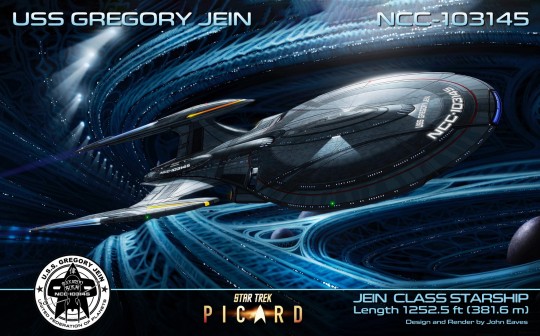
The USS Gregory Jein, the first of it's class, designed by long time Trek concept artist John Eaves, for season 3 of Picard as well as a tribute to recently departed cinematic model maker Greg Jein...
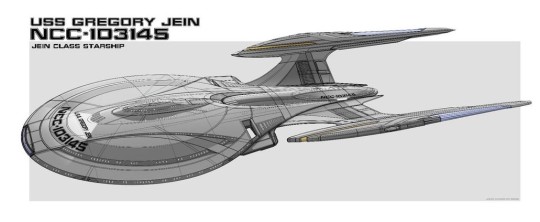
...bears a striking resemblance to Cris Rios' former command, the Curiosity-class USS Ibn Majid, seen in season 1 of Picard only in the form of a silhouette on Cris' footlocker.
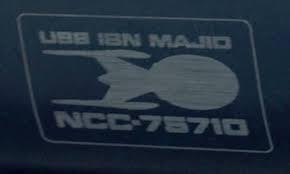
#uss gregory jein#picard season 3#john eaves#rip greg jein#uss ibn majid#cris rios#picard season 1#headcanon is that it's the same ship
2 notes
·
View notes
Text
Riker says "We've been having trouble with the kzinti" and that's a fucking reference! I had flashbacks of that TAS episode Larry Niven put his OCs into.
2 notes
·
View notes
Text
"If a single drone steps one millimeter out of that cargo bay, I'll decompress that entire deck. You won't pose much of a threat floating in space."
Scorpion pt 2, Star Trek Voyager season 4.
The foreshadowing to that Picard episode with the Borg cube 👀
#thesevenwondersofawitch#star trek voyager#Scorpion pt 2#chakotay to seven of nine#commander chakotay#seven of nine#Voyager season 4#Voyager#picard#borg#the borg#borg cube#picard s1#Picard season 1
7 notes
·
View notes
Note
Narissa is the stereotype of the evil bitch, and people want me to believe Star Trek is progressist. I'm not even talking about Discovery, they robbed us of 2 WOC in charge of the ship. For all I care, those shows can die.

Well, someone is a little salty, but let me roll up the Narissa and Narek Defense Squad and brush up my Romulan's are not the bad guys thesis.
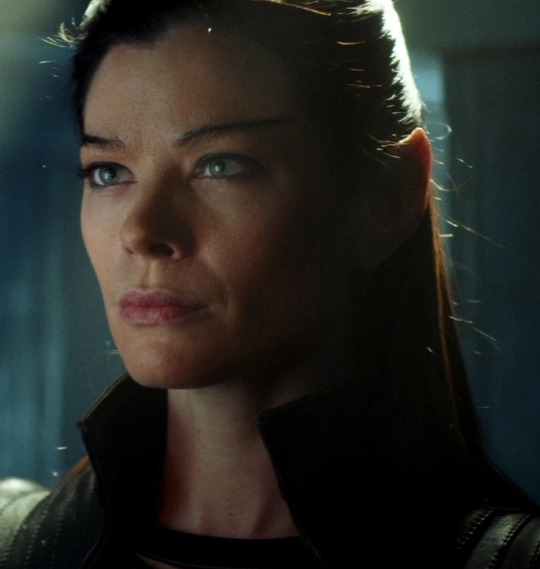
Now, I admit Narissa is a little flat as a character personality wise, but alas we all can't have quippy marvel one-liners as our baseline bestie. The Lannister vibes though were peak and nothing anyone can say will sway me on that, i could write an entire book on why Cersi was a bad bitch but that is for another time.
On to more fun things. My beloved Romulans. My friend, you do realize that little miss flat personality went through a supernova that wiped out anything fun. Only to then experience the Admonition where they synths really were trying to wipe out everything. So I don't think she was that much of an 'evil bitch'.
Yes, yes. Killing Hugh bad, he was a little puppy man, y'all will say. None the less he wasn't doing much of anything and really was only there for the shock factor of 'Oh no the puppy man died.' Just like Icheb was only there to give Seven something to cry over. The writing is not great you guys I don't know what yall are here for if not for the general vibes and the ability to head canon what you want.
Now I don't actually know what you are referencing with the Discovery part because I am pretty sure Michael has been the protagonist of Discovery since the beginning, I guess she has only been like captain captain for a season but she is captain in spirit? And like yea Disco has gotten a little preachy with the writing in my opinion but it is still a fun show.
I guess have fun watching something else.
Pride asks
#Ask me#Narissa#romulans#star trek#Picard season 1#they hate to see a bad bitch winning#just like I hated seeing that bad bitch getting yeeted into the void#pride asks#pride#romulan#romulan anon 2.0
4 notes
·
View notes
Text
Just finished Picard season 1, actually I ended up skimming thru most of it because it just laid there like a bored android.
The pacing is painfully slow.
Checkov's character ex machina cast.
There are 2-3 men who look pretty much the same and I don't care if they're separate characters.
Why are you learning the name of this new character, you'll probably never see them again.
I don't like main robot girl, don't know what it is but I just don't like her.
Even with the over-arching story things could have been reorganized and aside from a 2 part finale I can see where it could have been remade episodic like the TV shows.
Welcome back, here's your red shirt
Where the cube ends up at the end feels like a wasted plot
They're going to punish some of these people for what they did, right?
0 notes
Text
#yes there is only one mobile emitter because reasons#holosquad#holo-squad#holo squad#emil (emh)#Emmet (ETH)#ian (eeh)#Enoch (enh)#mister hospitality#steward (ehh)#santiago cabrera#star trek picard#Picard season 1
53 notes
·
View notes
Text
Any other Picard muses out there?

My kingdom for anyone who wants to RP Narek with me. Anybody? (Bueller?)
Discord, Dreamwidth, Insanejournal, here, hell I will take smoke-signals and semaphore at this point.
I need that shady romulan washout in my life, i need that sweet emotional turmoil/catharsis since neither he nor soji got actual narrative endings/closure. I am not above bribery and am fully willing to try/adopt a rare character in exchange. And yes, I am threatening you (prospective rp partner) with a good time.
#star trek rp#roleplay#scifi rp#sci fi rp#st rp#st roleplay#roleplay want ads#tumblr rp#not rp#not ic#narek#soji#soji asha#star trek picard#picard s1#picard season 1
0 notes
Photo




“Seven of Nine?!”
“You owe me a ship, Picard.”
Star Trek: Picard, Season 1, Episode 4
22 notes
·
View notes
